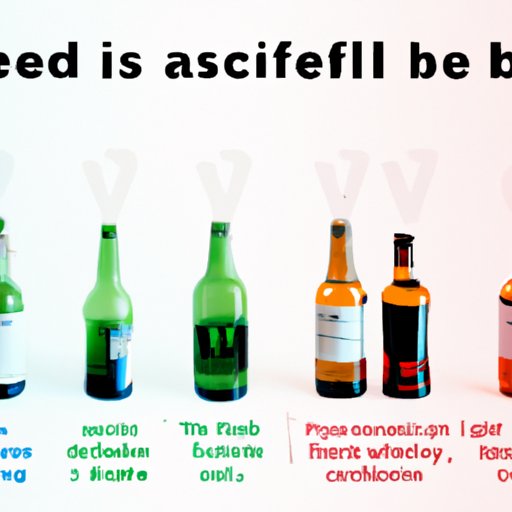Introduction
Alcohol is a popular drink that has been consumed by humans for thousands of years. From ancient civilizations to modern day society, it has been used for various purposes, from religious ceremonies to social gatherings. But what exactly happens when you drink alcohol? How does it make you feel?
Before delving into the effects of alcohol on the body and mind, let’s define what we mean by “alcohol”. Alcohol is a substance that is made up of ethanol molecules and is found mainly in beer, wine, and spirits. It is also known as ethyl alcohol, or simply “booze”.
In this article, we will explore how alcohol affects your body and mind, and how different types of alcohol can affect you differently. We will also analyze the role of genetics and environment in alcohol consumption.

Exploring the Physical Effects of Alcohol
When you consume alcohol, it enters your bloodstream and is quickly absorbed by your body. This leads to a range of physical effects, including increased heart rate, decreased coordination, and impaired judgment.
The first effect of alcohol on the body is an increase in heart rate. As soon as alcohol hits your bloodstream, your heart begins to beat faster as it pumps the alcohol through your body. This can lead to feelings of excitement and energy.
Alcohol also impairs your coordination and balance. As alcohol levels in your bloodstream rise, your ability to move and think clearly decreases. This can lead to clumsiness and difficulty walking or standing.
Finally, alcohol impairs your judgment. As your blood alcohol content (BAC) rises, your ability to make sound decisions decreases. This can lead to risky behavior and poor decision-making.

Examining the Psychological Impact of Alcohol
In addition to its physical effects, alcohol also has psychological effects. These effects are often more subtle than the physical effects, but they can still have a profound impact on your life.
One of the most common psychological effects of alcohol is an increase in emotions. When you drink, your brain releases chemicals that can cause you to feel happy, sad, or angry. This can lead to changes in behavior, such as aggression or recklessness.
Stress can also play a role in alcohol consumption. People who are under a lot of stress may turn to alcohol as a way to cope with their emotions. This can lead to increased consumption and, eventually, addiction.
Finally, genetics can play a role in how alcohol affects you. Studies have shown that some people are more prone to addiction due to genetic factors. This means that if you have a family history of alcohol abuse, you may be more likely to become addicted.
Investigating Short-Term and Long-Term Feelings After Drinking Alcohol
After drinking alcohol, you may experience a wide range of feelings. These feelings can vary depending on how much you drank, how often you drink, and your individual tolerance level.
Common short-term feelings after drinking include drowsiness, confusion, and nausea. These feelings typically peak shortly after drinking and last for a few hours. In extreme cases, these short-term effects can lead to blackouts or memory loss.
Common long-term feelings after drinking include guilt, depression, and anxiety. These feelings can linger for days or even weeks after drinking, and can lead to serious mental health issues if left unchecked.

Understanding How Different Types of Alcohol Affect You Differently
Different types of alcohol can affect you differently. Beer, wine, and spirits all contain different amounts of alcohol, and all have different tastes and intensities.
Beer typically contains less alcohol than other types of alcohol. It is usually light in color and flavor, and has a lower alcohol content than wine or spirits. Wine typically contains more alcohol than beer, and can range from sweet and fruity to dry and complex.
Spirits, such as whiskey and vodka, typically contain the highest amount of alcohol. They are usually clear in color and have a strong taste and smell. Spirits are often served in smaller servings than beer or wine.
Analyzing the Role of Genetics and Environment in Alcohol Consumption
Genetics and environment both play a role in how alcohol affects you. Your genes can influence your tolerance level, cravings, and risk of addiction. Your environment can also influence your drinking habits, as certain environments may encourage or discourage drinking.
The role of genetics in alcohol consumption is not yet fully understood. However, studies have shown that some people are more prone to addiction due to genetic factors. This means that if you have a family history of alcohol abuse, you may be more likely to become addicted.
Your environment can also influence your drinking habits. Certain environments may encourage drinking, while others may discourage it. For example, if you are surrounded by friends who drink heavily, you may be more likely to drink heavily yourself.
Conclusion
In conclusion, alcohol can have both physical and psychological effects on the body. It can increase your heart rate, impair your coordination and judgment, and lead to emotional changes. Different types of alcohol can affect you differently, and genetics and environment can both play a role in how alcohol affects you.
It is important to remember that drinking alcohol can lead to serious health problems if consumed in excess. If you choose to drink, do so responsibly and be aware of the physical and psychological effects of alcohol.
(Note: Is this article not meeting your expectations? Do you have knowledge or insights to share? Unlock new opportunities and expand your reach by joining our authors team. Click Registration to join us and share your expertise with our readers.)
